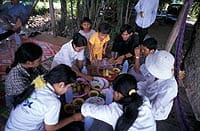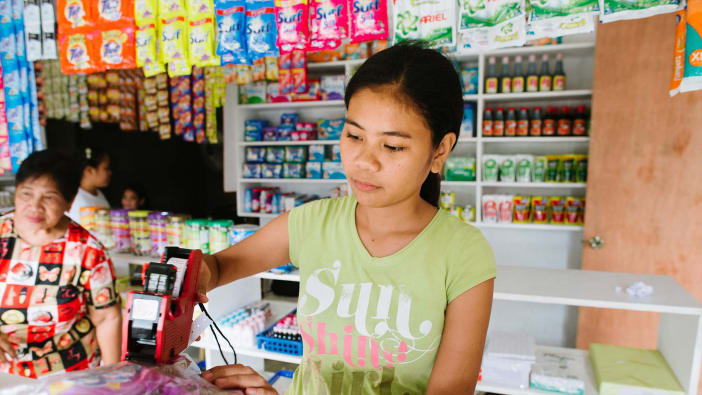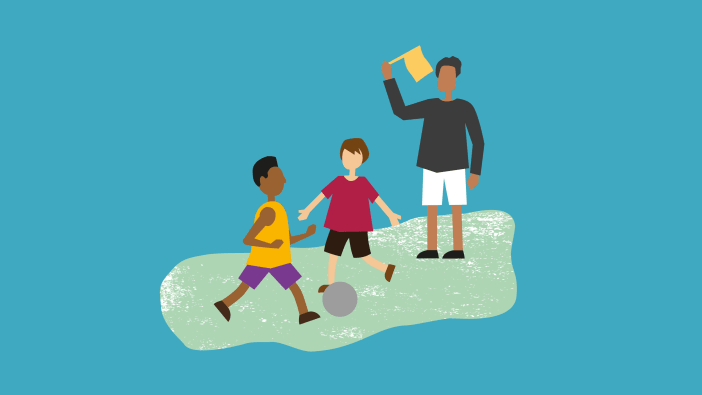by Esly Regina Carvalho.

Articles
Pressures on the family in a changing world
The pressures on families today are huge. All you have to do is look around. Christian counsellor and psychotherapist Esly Regina Carvalho reflects on the ways to address modern-day challenges to biblical family life
2003 Available in English, French, Spanish and Portuguese

From: Families under pressure – Footsteps 55
Practical ideas for supporting strong and healthy families

Photo: Jim Loring/Tearfund
The pressures on families today are huge. All you have to do is look around. Many families may have only one parent, some children have no parents (often as a result of HIV/AIDS) and live in child-headed households. Some families are looking after orphans. In addition, modern life, particularly in urban areas, has put enormous pressures on the family and on the values held within society. Some of these include:
Cultural values Many values and customs that were accepted until recently have undergone great changes in the last few decades. Behaviour that was completely unacceptable when our parents and grandparents were young may now be acceptable. What is now shown on TV or in films was absolutely forbidden 10 or 20 years ago.
Social values Seeking personal pleasure without concern for the effects on other people is perhaps one of the social influences that has most changed our society. This has made it possible for things like pornography, divorce and child exploitation to increase. Although it is hard to measure, the selfishness of personal desire has caused much harm, including HIV/AIDS, sexually transmitted disease and unexpected pregnancies, especially amongst the young.
Religious values Many well-established religions are now able to share their beliefs around the world more effectively through the internet and modern technology. In addition, a number of new religions or sects are developing, sometimes with beliefs that question or threaten family values. Sexual values have changed and purity before marriage has lost the value it once had in some cultures. In the attempt to be ‘modern’ and up-to-date, many values have been abandoned, including those that were considered part of a ‘Christian culture’. Many people, particularly in urban areas, find that Christian values may now be seen as ‘old fashioned’.
One thing that has not changed for many thousands of years is sin. It continues to influence all of humanity. The abuse of alcohol breaks families apart and may result in huge damage to family life. Addictions to other drugs cause similar effects. Violence in the home results in both physical hurt as well as emotional and psychological damage. Sexual abuse, both within and outside the family, may cause lasting damage.
What can we do to help families?
First we must accept the reality of family life and face up to the challenges. Often it may seem easier to ignore the problems and hope they will go away. However, problems don’t go away when they are ignored. They go away because they are confronted and resolved in appropriate ways.
- The first step is to admit that there is a problem. If people do not admit there is a problem, there will certainly be no solution.
- Encourage them to ask for help. There are many places and institutions that can help people with their problems. People often fail to receive the help they need because they don’t ask for it.
- Encourage people to talk to other family members about the situation. Often people keep their problems to themselves and don’t realise that other family members are going through the same problems.
- Provide support and help. Often we can help others more than we imagine. If someone comes to you for help, listen and provide encouragement and support. Think of how they could find more help.
- When people feel they have no-one or nowhere to turn to, encourage them to ask God to bring someone into their life, or provide an event or circumstance, that will help them face their situation.
- Keep people’s trust sacred. Never tell their secrets to other people unless it is life-threatening or damaging to them-selves or to the well-being of a child.
- Read whatever useful materials you can find. Get to know the resources available in your community.
- Encourage people to keep going and never give up. Ask God to teach people what he wants them to learn with this situation.
Esly Regina Carvalho is a psychotherapist who teaches and trains in the area of Christian counselling, psychotherapy and the use of Bible-based role play. She has written various books and articles in Portuguese and Spanish on these topics. Her address is PO Box 915, Little Elm, TX 75068, USA. E-mail: [email protected] Website: www.plazadelencuentro.com
Support for families with young children
Ideas for action, which could extend the caring role of the church. They emphasise strengthening relationships between parents, children and communities.
Toddler groups for parents and young children to meet together – particularly important in cities, when parents may feel isolated from family networks.
Child care or nursery facilities to allow parents to do training or work. By charging a small fee, this can provide work for the carers too.
Holiday clubs for children during school holidays when parents are working.
Toy and book libraries for children of poor families.
Parenting classes to help parents understand and cope with different stages in the development of their children.
Family activities to encourage families to relax and have fun together.
Adapted from Children and Family Breakdown: Children at Risk Guidelines Volume 1 by Tearfund.
Similarly Tagged Content
Share this resource
If you found this resource useful, please share it with others so they can benefit too.

Subscribe to Footsteps magazine
A free digital and print magazine for community development workers. Covering a diverse range of topics, it is published three times a year.
Sign up now - Subscribe to Footsteps magazine





